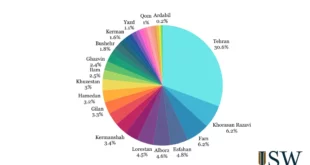Azerbaijan deployed thousands of mercenaries in last year’s 44-day war that it and Turkey waged against Artsakh/Nagorno-Karabagh and Armenia.
Azerbaijan thereby flagrantly violated the UN’s International Convention against the Recruitment, Use, Financing and Training of Mercenaries (UNMERC) which it signed in 1997.
Forty-six countries have signed UNMERC including Belgium, Cyprus, Germany, Italy, New Zealand, and Poland.
These mercenaries are not clean-cut military men. They’re terrorists, thugs, jihadis, and fanatics.
The Evidence
They include former ISIS commander Sayf Balud, and members of the Hamza Division, Sultan Murad Brigade, Al-Amshat Militia, Free Syrian Army (FSA/SNA), and other factions.
Many were brought into Azerbaijan before the war began on September 27, 2020. Unknown numbers remain there despite the November 9 armistice.
Armenian forces captured two mercenaries who came from Syria’s Hama and Idlib provinces.
The independent, UK-based, Syrian Observatory for Human Rights has confirmed Azerbaijan’s employing mercenaries. In October, it numbered them at over 2,050 with 145 dead.
Columbia University’s Institute for the Study of Human Rights has named the chief mercenary commanders, such as Fehim Isa of the Sultan Murad Brigade, and their organizations.
Video and audio recordings have identified many of the mercenaries.
Azeri soldiers have forced some of them into battle at gunpoint and lied about the combat conditions. “Haji … don’t come,” warned one mercenary. “We have been deceived … this is a meat grinder.”
Earlier Mercenaries
Azerbaijan’s importing mercenaries/jihadis is nothing new. Nor is its involvement in terrorism.
In the 1990s, Azerbaijan hired Afghan Mujahedin, Chechens, Pakistanis, and Turkey’s terrorist Grey Wolves to fight Armenians.
Al-Qaeda cells in Baku facilitated the 1998 bombings of U.S. embassies in Kenya and Tanzania.
Over 900 Azerbaijanis have joined ISIS.
Azerbaijan’s Silk Way Airlines has transported weapons to terrorist organizations.Azerbaijan’s political and military cultures are clearly deranged, as are Turkey’s.
Turkey is a shameless, longtime ISIS supporter, which the U.S. Treasury Department just identified as a “logistical hub” for ISIS.
Turkey and Azerbaijan’s Guilt
Most of the mercenaries used by Azerbaijan were flown in by Turkey. They often came from the ranks of Turkey’s proxy jihadist organizations (named above) in Syria who had reportedly committed atrocities and war crimes there.
Turkey typically recruits jihadis/mercenaries through SADAT, a quasi-official Turkish military contracting company. Led by former Brigadier General Adnan Tanrıverdi and other Turkish officers, SADAT is loyal to Turkish President Erdogan. Turkey’s use of SADAT contravenes the UN’s Guiding Principles on Business and Human Rights.
Turkey has also been sending terrorists and jihadis to fight in Libya’s civil war.
Azerbaijan may also have recruited mercenaries from elsewhere, such as Pakistan, according to some reports.
Regardless of the source of the mercenaries, Azerbaijan has brazenly violated UNMERC.
Charges against Turkey and Azerbaijan
A bi-partisan letter to the State and Defense Departments by one hundred U.S. House members has criticized “Turkish backed foreign mercenaries [in Azerbaijan], many alleged to have ties to internationally recognized terrorist groups.”
A European Parliament resolution has deplored “the transfer of foreign terrorist fighters by Turkey from Syria and elsewhere to Nagorno-Karabakh, as confirmed by international actors, including the OSCE Minsk Group Co-Chair countries.”
On November 6, 2020, the UN’s Working Group on the use of mercenaries and two Special Rapporteurs sent a strongly worded, eight-page letter to Turkey and Azerbaijan that detailed the charges against them.
The way “Syrian fighters are allegedly being recruited, transported and used in the Nagorno-Karabakh conflict appears consistent with the definition of a mercenary, as set out by relevant international legal instruments. Furthermore, their deployment appears to have contributed to the rapid escalation and intensification of hostilities, in turn resulting in civilian harm and suffering.”
Seventy-six days later — in a short, vacuous, and predictably arrogant reply — Turkey called the Working Group’s charges “fake news.” Azerbaijani President Ilham Aliyev has similarly denied using mercenaries.
UNMERC signatory Georgia is also culpable. It has knowingly permitted Turkey to use Georgian airspace to transport the terrorists to Azerbaijan.
Next Moves
Armenia has just filed war crimes lawsuits against Azerbaijan in the European Court of Human Rights.
Armenia, a member of the UN Human Rights Council, should also petition that organization to promptly sanction Azerbaijan, Turkey, and Georgia.
The case against the three countries could not be clearer. A lengthy investigation would be superfluous and counterproductive.
UNMERC signatories are especially obligated to hold the guilty parties accountable.
Human rights organizations worldwide must demand action, not mere words, from their respective governments and the UN.
 Eurasia Press & News
Eurasia Press & News



